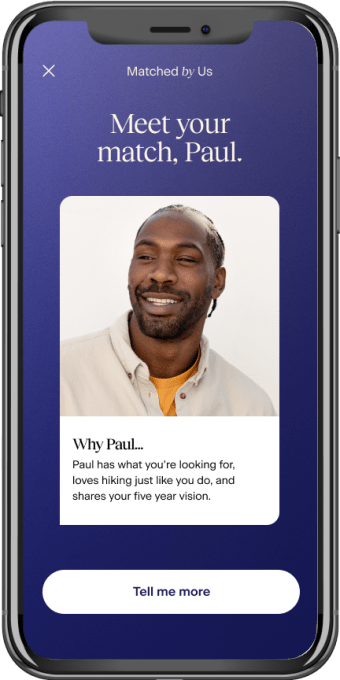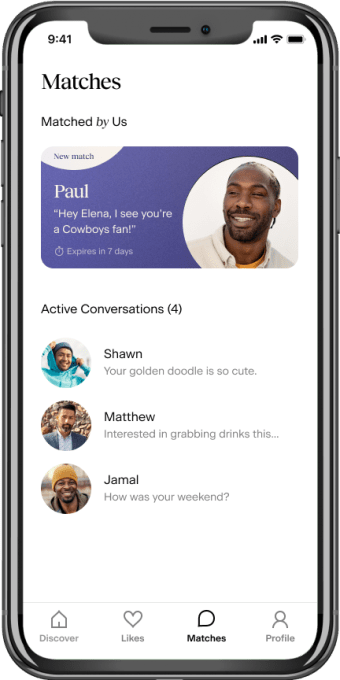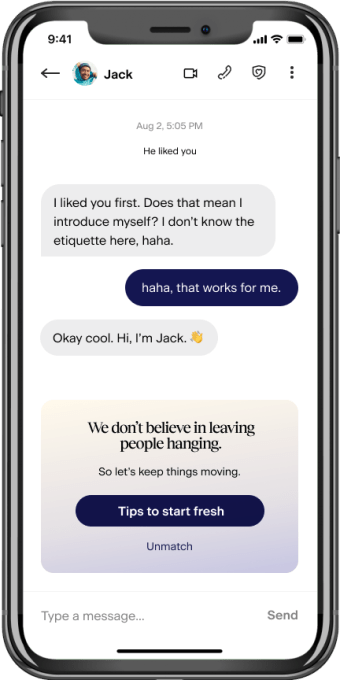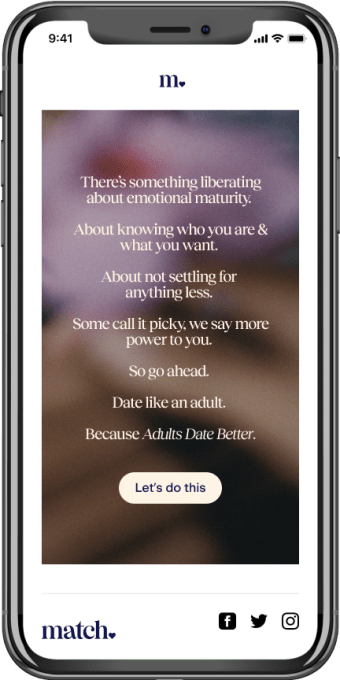Match today is introducing new features that aim to address some of users’ complaints with modern-day dating apps — like how much time it takes to find a relevant match and how frustrating it is when users ghost one another after the initial conversation fades. As part of a new strategy to better position Match for more “emotionally mature” singles (read: adults), the company says it will begin beta testing a recommendation system called “Matched by Us,” which may pave the way for a broader matchmaking service in the future. It’s also testing an anti-ghosting feature which pushes users to either continue a conversation or unmatch the recipient, instead of leaving them hanging.
The features are designed to address the challenges that face Match’s older demographic. Match users tend to be in their 30’s and up, and have full lives. They’re generally ready to find relationships and settle down with a partner. That’s a different life phase than those using other Match dating apps, like Tinder, where younger users are still in a more exploratory phase and enjoy on going on many dates, including casual dates.
“When we talk to our members, we hear a lot of frustration around [there being] a lot of swiping, a lot of messaging back and forth — that’s happening in the dating world more broadly,” explains Dushyant Saraph, Match’s Chief Product Officer. “When we think about folks on our product, who don’t have a ton of time, that’s where ‘Matched by Us’ came from. Our singles don’t want to swipe through hundreds of profiles,” he says.

Image Credits: Match
The new feature, which is made available to free and paid users alike, will present one, free customized match every week, where both users can see each other and no longer have to wait for a “like” back in order to engage in a conversation.
The system works to find compatible matches by algorithmically examining a new set of preferences around users’ personalities, based on responses to questions posed in users’ Match bios.
For example, questions may ask about users’ five-year plans, their favorite weekend activities, or whether they’re open to moving somewhere new if they find the right person. The latter has become especially relevant in the new age of remote work, driven by the pandemic, which no longer requires people to live in the bigger cities where their company may be headquartered, Saraph notes.

Image Credits: Match
Currently, the system will recommend a match based on a holistic view of users’ preferences, as determined by an algorithm, but the company has been internally testing adding a layer of human curation to its suggestions, as well.
In other words, Match is testing an actual match-making service.
For the time being, however, the human curation team inside Match is working in more of an R&D capacity, Saraph says.
“We’ve been flexing how many experts we need as we’re testing kind of different concepts — everything from coaching to expert picks, where we’re doing human curation,” he says. The team also works on other features, like suggesting conversation starters to keep conversations going.
“Long-term we expect to be flexible, depending on which of these [products] is most interesting to our members, and scaling up our expert team accordingly. Right now, human curation is one area that we’re really excited about and want to crack, and I think you’ll hear more about that in the coming months,” Saraph adds.
Another new feature aimed at helping adults to stop waste their time on dating apps involves how Match will handle matches’ conversations. Typically, conversations either take off leading to real-world dates, or slowly fade away, until communication stops altogether. Sometimes, the other party simply “ghosts,” and never responds at all.

Image Credits: Match
Users told Match that their main issue with ghosting is the uncertainty around what it means.
Did the user just get busy, or did they decide they weren’t interested?, users wonder.
A new feature aims to keep conversations’ momentum going by nudging users when a conversation is about to “expire” — that is, when it will be archived into a new section of the inbox for inactive conversations.
And if you are in the app, you can visit the conversation to get suggestions of conversation starters to help you pick things back up, or you can tap a button to unmatch the other user. The latter would send a more explicit signal to the recipient that there was a lack of interest, though it won’t actually push a notification that tells the user they’ve been unmatched. (That can sometimes lead to safety issues, particularly for women who have received threats from men they’ve rejected.)

Image Credits: Match
Match says it’s currently testing the right number of days to elapse before it nudges users to either re-engage or end their conversations with an unmatch. But the right amount of time seems to be in the three to five-day range, Saraph says.
The new features are rolling out to some portion of Match’s U.S. user base in beta, as the company kicks off a new brand campaign targeting adult daters. The campaign’s message is that Match understands what modern adult singles are looking for in order to date better, and these features are an example of that understanding being put into practice.
The beta tests are rolling out across all Match platforms, including iOS, Android, mobile web and desktop over the next few months, starting in the U.S.
The news follows a mixed earnings report from the dating app giant, Match Group, which owns top brands including Match, Tinder, OKCupid, Plenty of Fish, Hinge, and others. The company saw the impact of a pandemic recovery in the second quarter, with 15 million paying customers across its brands, up from 13 million in the year-ago quarter. Revenue was $707.8 million, topping analyst projections of $694 million. But Match Group missed on earnings, with net income of $140.9 million, or 46 cents a share, when analysts expected 49 cents per share.
The company also spoke in detail about its plans for social networking app maker Hyperconnect, a company Match bought for $1.73 billion earlier this year. Match Group said it plans to add audio and video chat, including live video, to its dating brand portfolio.
Match’s dating app is among those that will benefit from Hyperconnect integrations, Saraph told TechCrunch, as Match plans to explore “building out live experiences.” The company expects these to be added around year end towards the beginning of 2022, we’re told.
Source: Tech Crunch

